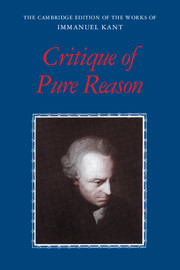II - Transcendental doctrine of method
Summary
If I regard the sum total of all cognition of pure and speculative reason as an edifice for which we have in ourselves at least the idea, then I can say that in the Transcendental Doctrine of Elements we have made an estimate of the building materials and determined for what sort of edifice, with what height and strength, they would suffice. It turned out, of course, that although we had in mind a tower that would reach the heavens, the supply of materials sufficed only for a dwelling that was just roomy enough for our business on the plane of experience and high enough to survey it; however, that bold undertaking had to fail from lack, of material, not to mention the confusion of languages that unavoidably divided the workers over the plan and dispersed them throughout the world, leaving each to build on his own according to his own design. Now we are concerned not so much with the materials as with the plan, and, having been warned not to venture some arbitrary and blind project that might entirely exceed our entire capacity, yet not being able to abstain from the erection of a sturdy dwelling, we have to aim at an edifice in relation to the supplies given to us that is at the same time suited to our needs.
- Type
- Chapter
- Information
- Critique of Pure Reason , pp. 625 - 627Publisher: Cambridge University PressPrint publication year: 1998

